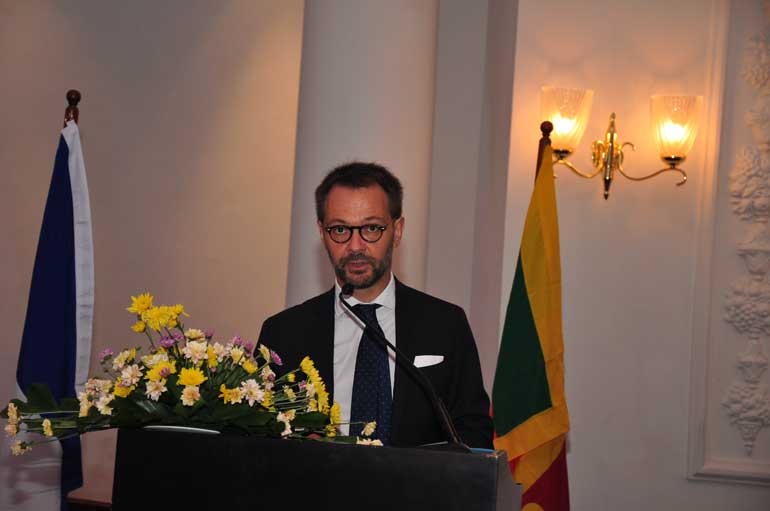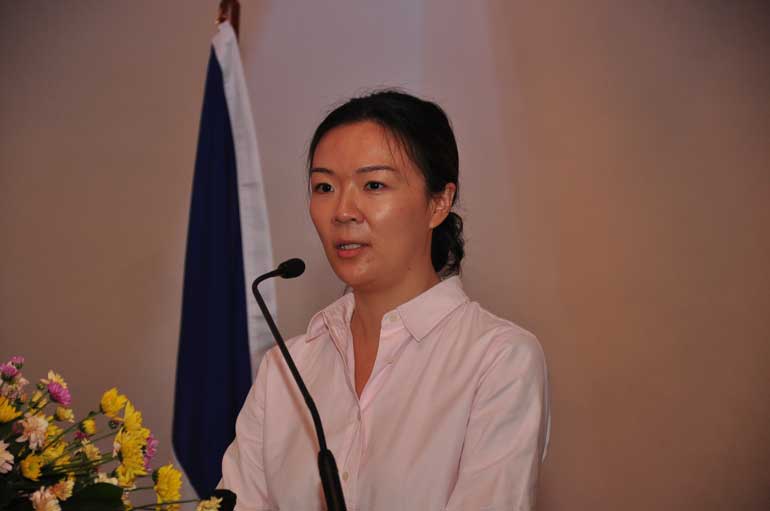Saturday Dec 20, 2025
Saturday Dec 20, 2025
Thursday, 15 October 2015 00:03 - - {{hitsCtrl.values.hits}}

France Ambassador Jean-Marin Schuh 
World Bank Green Finance Specialist Zhuo Cheng
By Charumini de Silva
The importance of the banking sector swiftly and sincerely embracing “green financing” for sustainable development came under the spotlight yesterday as the world is seeing a rapid shift in responding to environmental concerns.
In a world of still prominent banking intermediation, banks should adapt their business model to climate change by reorienting their funding towards low-carbon projects, Ambassador of France in Sri Lanka and the Maldives, Jean-Marin Schuh said.He added that the challenges currently faced by climate change were going to be significant in time to come and thus financial institutions had to play a key role in the transition towards a carbon neutral economy.
“It is time that banks to take measures aiming at addressing climate change. Banks should consider their business models to encourage low carbon projects and help the transition towards a carbon neutral economy,” Schuh said.
The Ambassador made these remarks at a breakfast conference on ‘Green Finance’ which was jointly organised by the Embassy of France and French Agency of Development (AFD) yesterday to mark International Day for Natural Disaster Reduction.
He further asserted that during the first 10 days of December, France will host and preside over the 21st session of the Conference of the Parties (COP21) in Paris. This conference is the largest diplomatic event ever hosted by France with over 40,000 delegates and visitors from 195 countries attending.
Noting that the stakes were high and goals were twofold, he said the international community had to reach a legally binding agreement that would enable mankind to limit global warming to 2˚C over the next century compared to pre-industrial level; and mobilise starting from 2020, $100 billion per year by developed countries from public and private sources.
“At present many public and private finance actors from developing and developed countries have acquired experience in green financing to fund a sustainable development. This is notably the case in France and Sri Lanka which boast an experience worth sharing and discussing in the lead up to COP21,” he added.
The World Bank yesterday urged Sri Lanka to strive towards achieving a carbon neutral economy via concerted multi-stakeholder efforts.Emphasising on World Bank’s partnership with Sri Lanka in marching towards a carbon neutral economy, World Bank Carbon Finance Specialist Zhuo Cheng said that the partnership had been more targeted to assist Sri Lanka to achieve 20% Non-Conventional Renewable Energy (NCRE) sources by following sustainable and cost effective business models.
She said that Sri Lanka needed to mobilise more than $2 billion in the coming 20 years to achieve the 20% NCRE target. “Hence, to satisfy this huge investment demand, our partnership is quite actually focused on encouraging and helps Sri Lanka to build PPPs for investment through the technical assistance and compatibility in supported by the World Bank.”
Commenting on the green energy projects the World Bank is currently supporting in Sri Lanka, Cheng explained that they had plans to set up a wind power plant in Mannar as a pilot project and by June next year they hoped to submit the Green Climate Funding (GCF) proposal for Mannar wind power investment.
Sri Lanka has received support from the World Bank via the Public-Private Infrastructure Advisory Facility (PPIAF) to support capacity development to access GCF and for strengthening the Sri Lanka Climate Fund.
At present, Sri Lanka is preparing a Concept Note to apply for GCF readiness support.
“We have an important component in our partnership to provide compatibility to Sri Lanka Climate Fund (SLCF). This fund has been established in 2008 with the main objective to serve as a national level technical financial intermediary to catalyse PPPs for climate smart investments and also for the country to have direct access to international climate finance resources,” she explained.
Further she noted that besides the investment dimension, the fund would financially accompany willing countries in the design of their national policies and sectoral strategies intended to cope with the climate issue.
Highlighting the next steps of the World Bank, Cheng said that by December 2015 initial results of two to three sector studies which contribute to strategic sector planning for NCRE development and the draft design document package for carbon crediting program would be completed.
She also revealed that by September next year the Emission Reduction Purchase agreement between Sri Lanka and the World Bank would be signed.